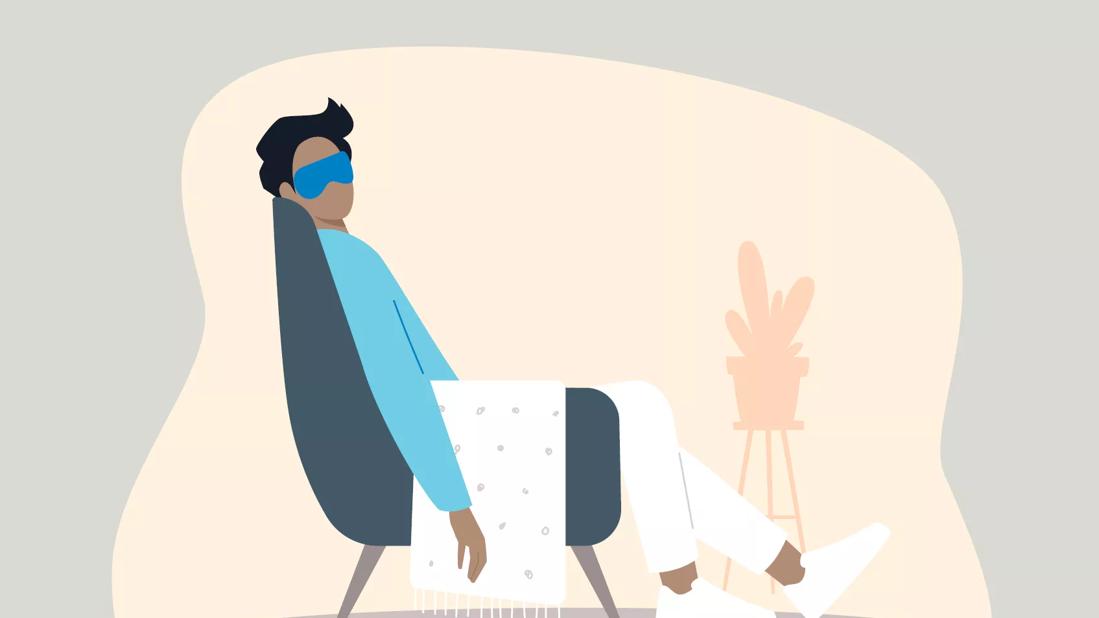
Image content: This image is available to view online.
View image online (https://assets.clevelandclinic.org/transform/6d9787b9-aa87-442a-bfd9-5b50b7504c7b/HowLongShouldYouNap-1298677076286x533-2_jpg)
Person asleep in a chair with an eyemask on and a blanket over their lap
Sometimes, nothing is more refreshing than a nice nap. Whether it’s a power nap after a long day at the office or on a nice, lazy weekend day, naps can help you feel rested and energized.
Advertisement
Cleveland Clinic is a non-profit academic medical center. Advertising on our site helps support our mission. We do not endorse non-Cleveland Clinic products or services. Policy
Naps have other health benefits, too. One study found that naps have the potential to boost memory when learning new information or new tasks. A midday nap can also help you feel more alert and reset you a bit emotionally, easing stress enough to help you be less impulsive and deal with frustration a little better.
But naps can also have their downsides. Naps for adults should be no more than an hour and probably best kept to the 15- to 20-minute range. Anything beyond that – especially considering the time of day – could have consequences. We caught up with sleep medicine specialist Nancy Foldvary-Schaefer, DO, MS, for more insight on how long your nap should be.
No matter how tired you are, your naps really shouldn’t stretch for more than an hour. At that point, you start risking interrupting your sleep schedule for the night ahead.
Naps should be relatively short for adults, something that can help keep you energized without interrupting your circadian rhythm. “You’ll probably want to nap for less than an hour,” Dr. Foldvary-Schaefer says. “If you can power nap for 15 or 20 minutes, all the better.”
While keeping naps short is important, so is making sure you take them early enough in the day. “You’ll probably want to nap earlier in the day, like before 2 p.m. or 3 p.m.,” she adds. Any later in the day can risk interrupting your sleep schedule.
Advertisement
It’s not that long naps are bad for you, exactly, but they do carry risks. The biggest risk is sleep inertia. “Napping for an hour or longer increases your risk of falling into the deep stages of sleep,” Dr. Foldvary-Schaefer points out.
Those stages are harder to wake from, and the consequence of waking out of those later, deeper sleep cycles is confusion. “When this happens, you’ll wake up with a groggy feeling where you don’t even know where you are. That’s sleep inertia,” she says. “Your nap may not even be refreshing.”
Plus, as mentioned, if your naps go too long and too late in the day, you could throw your sleep schedule off, making it harder to fall asleep that night. And that can kick off a vicious cycle of lost sleep.
No, long naps aren’t meant to make up for lost sleep. In fact, long naps can negatively impact your “sleep debt,” the difference between the sleep your body needs and the sleep you actually get during the night.
“You start creating your sleep debt from the moment you wake up in the morning,” notes Dr. Foldvary-Schaefer. While a nap may help you refocus for a bit, it’s not a long-term solution. You may feel better that day, but it can create a cycle that compounds your sleep debt.
First, it can lead to short-term sleep issues. “If you let yourself sleep that debt off too early in the day, you’ll have trouble sleeping at night,” explains Dr. Foldvary-Schaefer. And that’s when naps can create a long-term issue with sleep debt.
Once you’ve derailed your sleep for a night or two, it becomes even harder to break out of the cycle. “When nighttime sleep is compromised, your wake times and bedtimes can start to vary which may lead to chronic sleep problems,” she adds.
Chronic sleep problems can, in turn, lead to bigger health complications, including:
The bottom line? Napping can be a huge benefit as long as you take the right approach: Do it earlier in the day and use an alarm to make sure you keep your nap at just the right length of time.
Advertisement

Sign up for our Health Essentials emails for expert guidance on nutrition, fitness, sleep, skin care and more.
Learn more about our editorial process.
Advertisement
How a quick catnap can give you a boost
Napping benefits and how to enjoy them
Break up with your snooze button by shifting your bedtime and establishing a consistent nighttime routine
Resolve to move a little more, drink a little less, eat a little healthier, sleep a little better and destress a lot
An ice bath can ease sore muscles and decrease inflammation after a workout
Head to bed in a bra to reduce breast pain, nipple irritation and stretch marks
Winding down before bed is key to better sleep
If they affect the quality of your sleep, keep your pets out of your sheets
Type 2 diabetes isn’t inevitable with these dietary changes
Applying a hot or cold compress can help with pain
Pump up your iron intake with foods like tuna, tofu and turkey